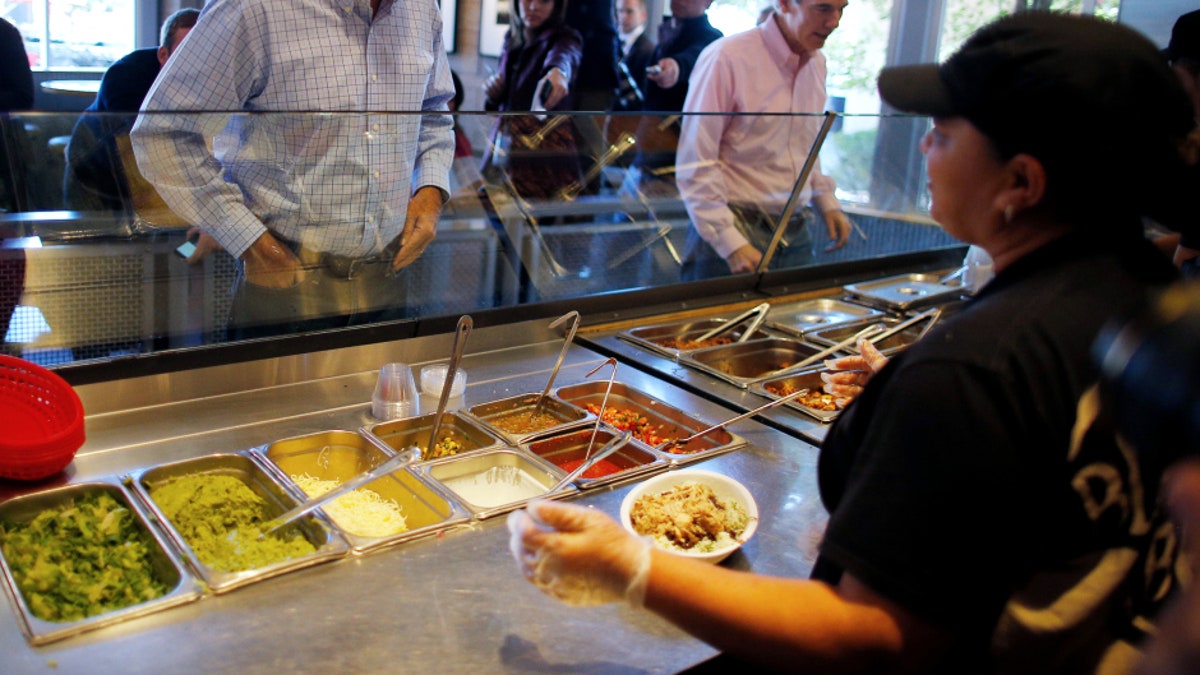
Now Chipotle's menu is entirely free of genetically modified ingredients. (Reuters)
When fast-food chain Chipotle announced last week that it had ditched ingredients containing genetically modified organisms (GMOs), you may have looked at your beloved burrito bowl a little differently. But should you? While many food activists are excited about the news, some scientists are giving the change the side-eye.
Here’s what you need to know about GMOs.
Myth: They’re Frankenfood
Genetically engineered crops are designed to be resistant to diseases and insects, or make them tolerant of herbicides. Soybeans, corn, canola, alfalfa (hay), sugar beets, papaya, squash, and cotton all have GMO versions available in the U.S.
“I really don’t like the image that always accompanies GMO articles: a poor tomato with a syringe in it,” said Alison Van Eenennaam, PhD, a biotechnology specialist at the University of California-Davis. “That’s not what happens. No one uses syringes or injects anything into anything. This is a breeding method,” she added.
The misconception is that there’s something in your food, but scientists are staunch about the fact that a genetically engineered and conventional crop are exactly the same.
“If you look at something like sugar, there is absolutely no way to tell if its derived from GMO sugar beets or sugar cane,” Van Eenennaam said.
RELATED: 12 Crazy Things That Happen to Your Food Before You Buy It
Myth: You should be scared
Yes, some in the scientific community question the safety of GMOs, want longer-term studies, and do not support them, and many European countries don’t allow their use. And critics point out that we need more independent studies evaluating safety—that is, studies not funded by the makers of genetically modified (GM) seeds.
However, the World Health Organization notes “no effects on human health have been shown as a result of the consumption of such foods by the general population.” In a 2014 meta analysis of more than 1,700 studies from the past decade, researchers writing in Critical Reviews in Biotechnology didn’t find any dangers connected to GM crops. And a study last year led by Van Eenennaam that looked at livestock that eat GM feed (they’ve chowed down on up to 90 percent of these crops for about 20 years) didn’t find any difference in their health either—and their milk, meat, and eggs were the same nutritionally compared to animals that ate conventional feed.
There has been research suggesting that GMOs are linked to health problems—but some of the studies have been highly criticized. The most well-known is a 2012 study originally published in Food and Chemical Toxicology that suggested that rats fed GMO corn were more likely to develop tumors, but it was later retractedbecause that breed of rat is prone to tumors.
“To ignore the hundreds studies that don’t show a problem and focus on one with design flaws is not looking at the weight of evidence,” Van Eenennaam said.
RELATED: 10 Bogus Health Trends That Waste Your Time
Myth: They’re controversial
Yes, GMOs are a contested issue—but not among who you may think. A recent Pew Research Center survey asked both scientists with the American Association for the Advancement of Science (AAAS) and regular people for their take on hot-button scientific topics, like animal research, climate change, and GM foods. They discovered that only 37 percent of the public said GM foods were generally safe, compared to 88 percent of the AAAS members.
“This shows there’s a big disparity between what the public believes and what the people who read the scientific literature believe,” said Bruce Chassy, PhD, professor emeritus in the Department of Food Science & Human Nutrition at the University of Illinois at Urbana-Champaign.
RELATED: The Truth About Internet Food Rumors
Fact: Food from non-GMO restaurants may still contain GMOs
Eliminating specific ingredients, like GMO corn in tortillas, doesn’t mean everything served at a certain restaurant will be free of GMOs. Van Eenennaam points out that milk used to make sour cream may come from cows that consume GMO feed, or the clotting agent in the cheese may be derived from a GMO microbe.
Chipotle says the meat and dairy it serves likely come from livestock given at least some GMO feed, with the exception being its 100 percent grass-fed beef. (So while its chicken and pork may be raised without antibiotics and hormones, they’re probably fed GMO grains.) The point? Genetic engineering is pervasive (it’s even used to make insulin!).
For a public company like Chipotle, ditching GMOs could also be viewed as a marketing tool that possibly takes advantage of consumer fears. On a page explaining the news, Chipotle wrote, “In our quest to serve the best ingredients, we decided to remove the few GMOs in our food so that our customers who choose to avoid themcan enjoy eating at Chipotle.” The company’s CEO has said that millennials are “more concerned with how food is raised and prepared than previous generations.”
Fact: It’s getting easier to choose non-GMO foods
What you eat is a personal decision, and if you’re not comfortable consuming GMOs, that’s completely fine, Chassy said.
“Over 20,000 products are GMO-free,” he said.
You can avoid genetic engineering by buying organic products (which can’t contain GMO ingredients by law) or looking for non-GMO labels, like the Non GMO Project stamp. It’s up to you to decide.
RELATED: 11 Superfoods Combos for Better Nutrition
But remember: being healthy is about a lot more—eating enough fruits and vegetables, getting ample sleep, exercising regularly. And two of the most common GMO crops are soy and corn. These ingredients are overwhelmingly found in processed, packaged fare—food you should generally aim to eat less of anyway in favor of more fresh stuff.
Oh, and while Chipotle burritos are delicious, a non-GMO Chipotle burrito can still top 1,000 calories. Yep, the same 1,000 calories as before.
